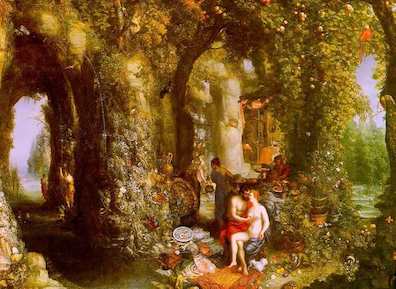Twice in Calypso, Bloom happily associates the
smell of tea and cooking food with the warmth of Molly's bed.
After being afflicted with a vision of old age on Dorset
Street, he turns into Eccles Street and conjures up a vision
of his bedroom to cheer himself up: "To smell the gentle smoke
of tea, fume of the pan, sizzling butter. Be near her ample
bedwarmed flesh. Yes, yes." Having returned home, he prepares
breakfast for his wife, takes it up to her, and enjoys the
scene in actuality: "The warmth of her
couched body rose on the air, mingling with the fragrance of
the tea she poured." The pleasurable associations between a
woman's warm presence and the smells of warm food probably owe
something to Homer's description of Calypso's cave.
When Hermes steps into Calypso's cave in Book 5 of the Odyssey,
he finds a paradisal scene:
Divine
Kalypso,
the mistress of the isle, was now at home.
Upon her hearthstone a great fire blazing
scented the farthest shores with cedar smoke
and smoke of thyme, and singing high and low
in her sweet voice, before her loom a-weaving,
she passed her golden shuttle to and fro.
A deep wood grew outside, with summer leaves
of alder and black poplar, pungent cypress.
Ornate birds here rested their stretched wings—
horned owls, falcons, cormorants—long-tongued
beachcombing birds, and followers of the sea.
Around the smoothwalled cave a crooking vine
held purple clusters under ply of green;
and four springs, bubbling up near one another
shallow and clear, took channels here and there
through beds of violets and tender parsley.
Only the scented smoke in this passage directly connects it
to Bloom's thoughts, but Gifford is probably right to detect
an allusion, or at least an inspiration. The seductive,
sensuous loveliness of Calypso's cave seems very consonant
with the appeal of Bloom's domestic scene.
It is hard to understand, though, why Gifford should
associate this passage only with the second of Bloom's
imaginations, the one he actually experiences in the bedroom.
He links the first one (the scene he imagines in the street)
with another passage in Book 1 of the Odyssey, when
Athena tells Zeus of Odysseus' suffering:
But
such desire is in him
merely to see the hearthsmoke leaping upward
from his own island, that he longs to die.
No doubt Gifford associates this passage with Bloom's
thoughts in the street because at that moment Bloom is longing
to return home. But Odysseus' longing for the hearthsmoke of
Ithaca has none of the associations with smell and with female
presence found in the one from Book 5. Nor do the two passages
in Calypso show any marked difference from one
another sufficient to associate one with Ogygia and the other
with Ithaca.
